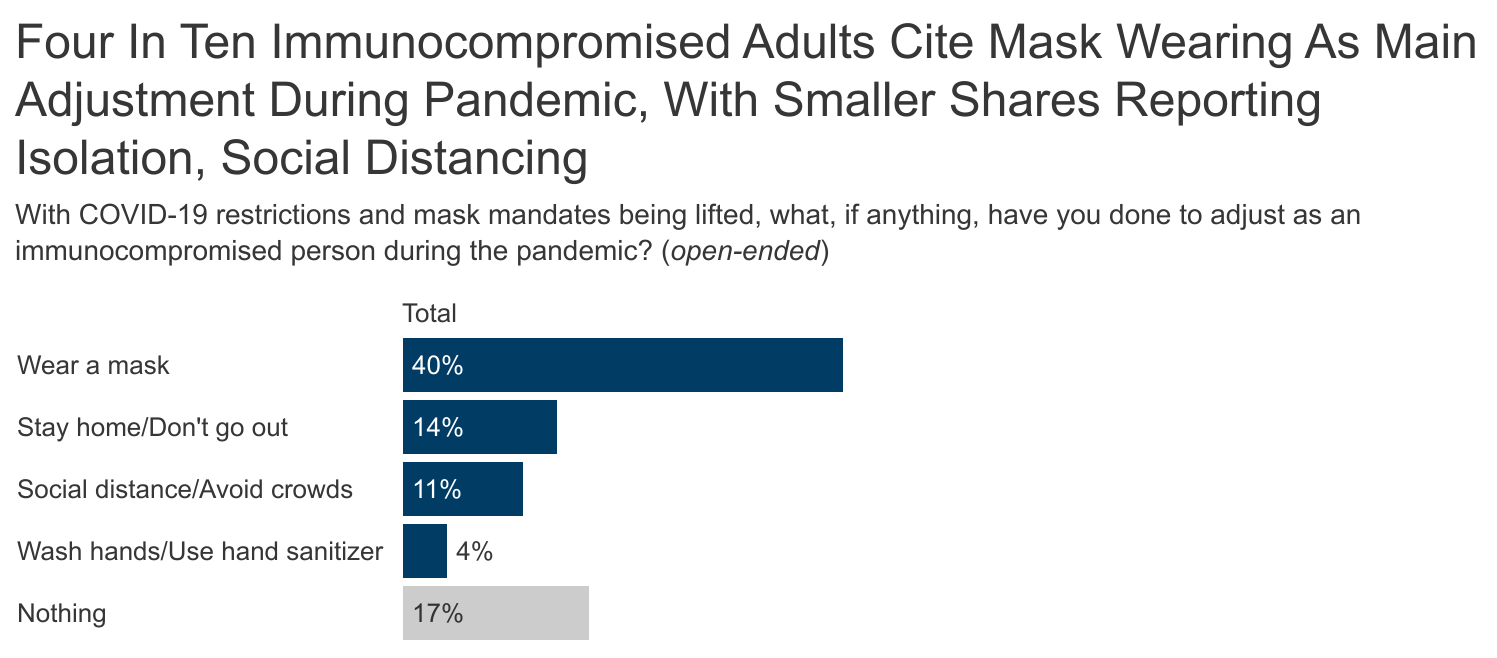As COVID-19 cases in the U.S. rise in a surge driven by the highly transmissible Omicron BA.5 subvariant alongside the widespread lifting of mask mandates and other coronavirus-related safety precautions, many immunocompromised adults and those with weakened immune systems continue to be at a higher risk of severe illness and death from a coronavirus infection, even after receiving the COVID-19 vaccine. The latest KFF COVID-19 Vaccine Monitor survey finds that adults who report having at any time been told by a doctor they have a weakened or compromised immune system are more likely than other adults to say they are worried about becoming seriously sick with COVID-19 or developing long COVID, while many continue to take precautions against COVID-19 such as masking and social distancing.
Who Reports Having Weakened Or Compromised Immune Systems?
Throughout the COVID-19 pandemic, many news reports have emphasized the increased sense of risk among some immunocompromised adults or those living with a chronic illness or disability. Prior KFF COVID-19 Vaccine Monitor polling from February showed that concern for immunocompromised adults was widespread, with a majority of the public expressing worry that immune-compromised people would be left behind if the government were to lift pandemic restrictions. KFF’s COVID-19 Vaccine Monitor survey finds that about one in ten adults (11%) say a doctor or health care provider has told them that they are immunocompromised or have a weakened or compromised immune system. Among adults in this group, two-thirds are women (66%) and about six in ten are ages 50 and older (61%). A majority of adults who say they are immunocompromised report that they are not currently employed, including one in five who are on disability or can’t work (20%),
Given the disproportionate risk of severe COVID-19 illness for immunocompromised adults, the CDC currently recommends a second booster dose for people who are moderately or severely immunocompromised. KFF’s most recent COVID-19 Vaccine Monitor survey shows that large shares of adults who say they were told by a health care provider that they have a weakened or compromised immune system report having received at least one dose of the COVID-19 vaccine (82%), including about six in ten (57%) who report receiving at least one booster dose. Just under one in five say they are unvaccinated (18%).
Heightened Worry Of Covid-19 Risk Among Adults Who Report Weakened Or Compromised Immune Systems
For immunocompromised adults and those with certain medical conditions, coronavirus poses a heightened risk of severe illness, the need for hospitalization or intensive care, and death.
Among adults who have at any point been told by a doctor or health care provider that they have a compromised or weakened immune system, a majority say they are either “very” or “somewhat” worried they will develop long COVID (65%) or get seriously sick from COVID-19 (61%). Fewer of those who have not been told they are immunocompromised report worrying over the effects of coronavirus infection, with just under four in ten reporting they are either worried about developing long COVID (37%) or getting seriously sick from COVID-19 (36%).
Continued Precautions Against COVID-19
While disproportionate shares of adults who report being told they are immunocompromised express worry over the effects of COVID-19 illness, further shares say they have continued to take precautions as pandemic-related restrictions have dissipated. When asked to say in their own words what they’ve done to adjust as COVID-19 restrictions and mask mandates are lifted, four in ten say they continue to wear face masks, with smaller shares saying they are still staying home (14%) and social distancing or avoiding crowds (11%). While substantial shares report making these adjustments as an immunocompromised person during the pandemic, about one in six (17%) say they have done nothing to adjust.
As the COVID-19 pandemic continues into its second year, many immunocompromised adults report taking continued precautions to mitigate the risks posed by coronavirus infection. Below, in their own words, are some specific adjustments that these more vulnerable adults have made.
In Their Own Words: With COVID-19 restrictions and mask mandates being lifted, what, if anything, have you done to adjust as an immunocompromised person during the pandemic?
“Gotten the Evusheld (monoclonal antibodies) injections; continue to wear masks in indoor public areas; avoid large gatherings; eschew hugging and hand shaking”– 62-year-old woman in Tennessee
“It’s restricted my access to several places, cost me money in PPE and sanitizers, and lowered my quality of life” – 25-year-old woman in Kentucky
“I’ve stayed home. Not particularly going around folks who I’m not sure of.” – 42-year-old man in North Carolina
“Still wearing a mask 100% when out and if around anyone who is vulnerable for any reason, age, health, etc.” – 70-year-old man in Wisconsin
“Limited outing, get fully vaccinated/boosted, always wear mask and stay away from closed areas and stay in open where there are fewer people” 45-year-old man in New Jersey
“Our household is still under a fairly tight quarantine and we mask in public, even outdoors” – 49-year-old woman in North Carolina
“I still wear a mask in smaller indoor spaces and keep my distance from people everywhere. I still wipe down shopping carts and other surfaces I will touch while shopping. I still wash my hands more than the average person would.” 50-year-old woman in Minnesota


I?m impressed, I must claim. Actually seldom do I run into a blog that?s both enlightening and also amusing, as well as let me tell you, you have struck the nail on the head. Your suggestion is exceptional; the problem is something that inadequate individuals are speaking wisely around. I am very happy that I came across this in my look for something associating with this. Jarvis Ciarlo
Thank you very much for sharing, I learned a lot from your article. Very cool. Thanks.